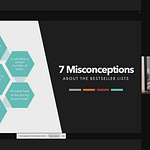Ghostwriting is booming.
Last year, a Gotham Ghostwriters’ survey (co-sponsored by the American Society of Journalists and Authors) found that 33% of ghostwriters earn more than $100,000 annually, and 25% charge at least $100,000 per project. Kevin Anderson, who runs a ghostwriting and editing firm, told the Wall Street Journal his company charges between $300,000 and $400,000 per project and handles “just shy of 500” projects yearly.
As hybrid publishing opens doors for celebrities and executives to bypass traditional publishers with their memoirs, demand for ghosts is at an all-time high. One industry expert even advised a roomful of writers: “Whatever you’re charging now, double it and add 20%.”
But how does it actually work? How do you break in? And what should you expect once you’re in the room with the client, the agent, and the publisher?
Few writers are better positioned to answer than Will Storr. He’s an acclaimed author (Selfie, The Science of Storytelling, The Status Game) and one of today’s most in-demand ghostwriters, with clients ranging from special forces veterans to world-famous designers. In our AMA, he spoke with refreshing candor about the business of ghosting, the craft of storytelling, and what separates a forgettable celebrity memoir from a book that actually moves readers.
Here are 10 insights from the conversation, blending business realities and craft lessons for anyone curious about the hidden world of ghostwriting.
(Editor’s note: some quotes have been lightly edited for clarity and concision.)
1. Ghostwriting is big business—especially in the U.S.
There’s no denying it: ghostwriting is having a moment. Big-name clients want books, and they rarely want to write them themselves. And in the U.S., that demand translates into serious opportunity: six-figure fees are increasingly common, and some firms charge $300K+ per project.
Will pointed out, though, that pay isn’t equal everywhere. In the U.K., publishers routinely offer what amounts to minimum wage for six months’ work. His first ghost gig, which went on to sell more than a million copies, paid him just £15,000.
“I think it’s different in the States, but certainly in the UK… publishing companies really lowball the ghost writers.”
The takeaway? If you’re U.S.-based, the market is primed for ambitious ghosts. Track record and negotiation matter, but the ceiling is high—and rising.
2. How to handle proposals and credit
Ghostwriting isn’t just about the writing—it’s about contracts, expectations, and visibility. One of Will’s pet peeves is being asked to write full proposals for peanuts. A strong proposal usually means you’ve already figured out the book’s angle and structure, which is half the work.
“If you’re writing the proposal, that means you’ve already cracked the structure, you’ve done all the interviews… You can’t write the proposal…without doing the intellectually hard stuff... working out the themes and all that stuff. And that’s not a £4,000 job, you know, that’s a joke.”
Credit is one of the trickiest—and most important—aspects to negotiate. While some ghostwriters accept anonymity, many ask for and receive partial credit: “with [Ghostwriter]” or “as told to [Ghostwriter]” on the cover, or acknowledgment in the foreword.
Royalties? Rare but possible. It depends on your leverage, the client, and the level of risk you’re willing to take. Most ghosts, however, are paid a flat fee upfront under “work for hire” agreements that transfer all rights.
For authors hiring a ghostwriter, the key takeaway is simple: be explicit from the outset. Spell out payment, rights, credit visibility, and usage. For ghosts, don’t be shy about asking for what you deserve—your voice behind the book still matters.











